“The likelihood is that this represents the end of the Unified Patent Court project, or at least a lengthy delay. The existing system whereby European patents are enforced separately in each member state will continue for the foreseeable future.”
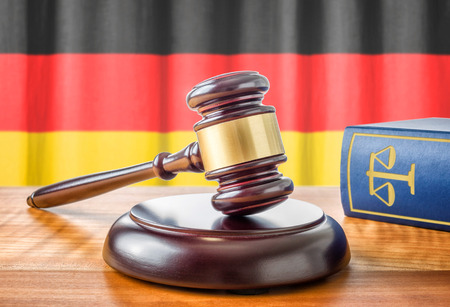 Judges in Germany have dealt what may be a fatal blow to the project to create a Unified Patent Court (UPC) in Europe.
Judges in Germany have dealt what may be a fatal blow to the project to create a Unified Patent Court (UPC) in Europe.
In a decision published today, the German Federal Constitutional Court said the Act of the Approval of the UPC Agreement was void. (BVerfG, Beschluss des Zweiten Senats vom 13. February 2020 – 2 BvR 739/17 -, Rn. (1-21).)
The Act of Approval was passed unanimously by the Second Chamber of the Bundestag but only about 35 members were present. The Court said that a two-thirds majority of the Bundestag was required.
The UPC Agreement was signed in February 2013, and had to be ratified by 13 EU member states, including the three largest patenting countries. It would set up a single court, with branches across Europe, to hear disputes on the validity and infringement of European patents.
Germany’s ratification would have brought the UPC into effect, but the president suspended ratification pending the Court’s decision. Separately, the UK recently said that it will not take part in the UPC after Brexit.
Two-Thirds Majority Required
In its decision, the Constitutional Court said that the UPC amends the German constitution in substantive terms, and hence requires a two-thirds majority in the Bundestag. Three of the eight judges dissented from the decision, which can be read (in German) here.
The Court’s press release states that sovereign powers should only be conferred in ways provided for by the Basic Law: “An act of approval to an international treaty that has been adopted in violation thereof cannot provide democratic legitimation for the exercise of public authority by the EU or any other international institution supplementary to or otherwise closely tied to the EU.”
The UPC had been broadly supported by industry and patent practitioners in Europe, who believed that, in combination with the proposed unitary patent, it would make it simpler to protect and enforce patents in Europe.
However, the Agreement involved compromises over issues such as language, jurisdiction and location—and was never universally supported. Notably, Spain and Poland decided not to participate.
The German constitutional challenge was brought by Düsseldorf lawyer Dr. Ingve Stjerna on several grounds. As the Court accepted the Bundestag argument, it did not consider the other grounds.
Unlikely to Move Forward in the Current Climate
The decision could leave it open to the Bundestag to try to pass the Act again with the required two-thirds majority. However, there must be some doubt in the current climate about whether (and when) the German government will be willing to bring forward another Act, whether it would secure the two-thirds majority, and – even if it did – whether another complaint would be brought.
The likelihood therefore is that this represents the end of the UPC project, or at least a lengthy delay. The existing system whereby European patents are enforced separately in each member state will continue for the foreseeable future.
The UPC Preparatory Committee said that, despite the decision, “the preparatory work will continue, while the judgment and the way forward is further analysed.”
These were some initial reactions on Twitter:

![[IPWatchdog Logo]](https://ipwatchdog.com/wp-content/themes/IPWatchdog%20-%202023/assets/images/temp/logo-small@2x.png)
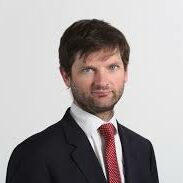
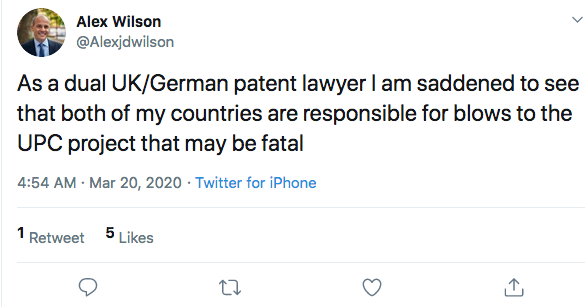
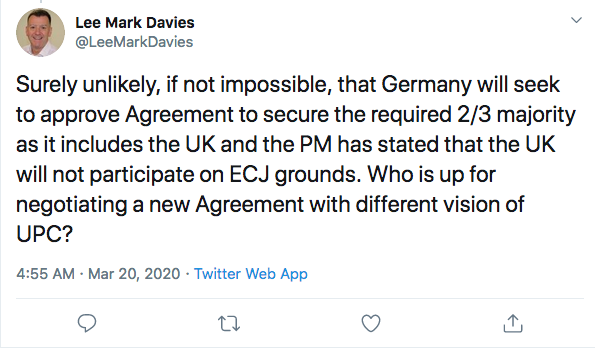
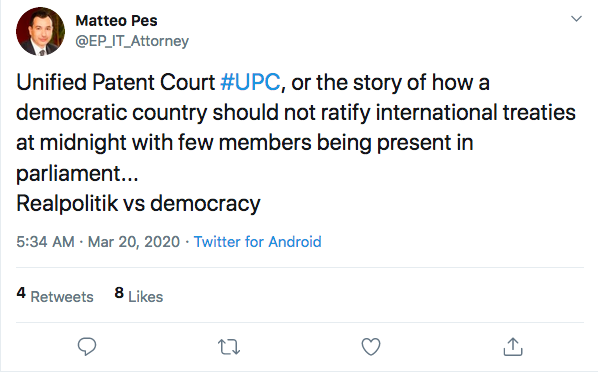
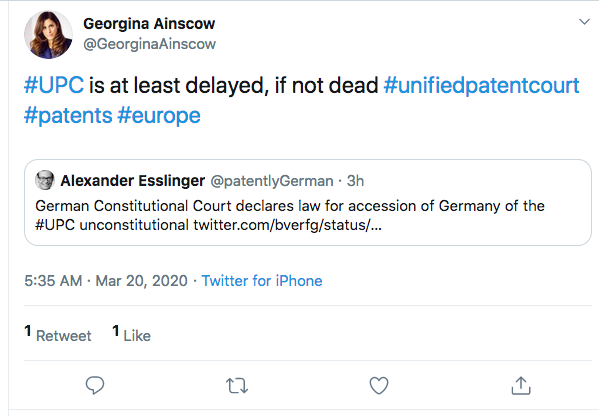
![[Advertisement]](https://ipwatchdog.com/wp-content/uploads/2024/04/Artificial-Intelligence-2024-REPLAY-sidebar-700x500-corrected.jpg)
![[Advertisement]](https://ipwatchdog.com/wp-content/uploads/2024/04/UnitedLex-May-2-2024-sidebar-700x500-1.jpg)
![[Advertisement]](https://ipwatchdog.com/wp-content/uploads/2024/04/Patent-Litigation-Masters-2024-sidebar-700x500-1.jpg)

![[Advertisement]](https://ipwatchdog.com/wp-content/uploads/2021/12/WEBINAR-336-x-280-px.png)
![[Advertisement]](https://ipwatchdog.com/wp-content/uploads/2021/12/2021-Patent-Practice-on-Demand-recorded-Feb-2021-336-x-280.jpg)
![[Advertisement]](https://ipwatchdog.com/wp-content/uploads/2021/12/Ad-4-The-Invent-Patent-System™.png)






Join the Discussion
15 comments so far.
Anon
March 24, 2020 08:57 amI have to (readily) disagree with your assessment as to what is ‘THE’ hard question in substantive patent law.
You again appear to want everyone else to wear your spectacles because they correct your vision, and this anyone else in need of vision assistance would benefit from your spectacles.
As to ‘best way,’ that’s an unproven assertion, and one that is not so amenable to a ‘just do it’ admonition, given as different Sovereigns do not even have a uniform approach to how to use the juristic fictional person of the Person Having Ordinary Skill In The Art.
MaxDrei
March 23, 2020 03:10 pmNo. The EPO has the best way of adjudicating obviousness. But English law does fact-finding (discovery, cross-examination) more rigorously than in civil law jurisdictions like the EPO. Let us distinguish between matters of law and matters of fact, and talk about how different jurisdictions have different ways to establish the facts.
The obviousness question is THE hard question in substantive patent law. The EPO has invented the best way to adjudicate it. The EPO way is fully compatible with both civil law and common law fact-finding processes. Nevertheless, there is a lot of prejudice (still) against the EPO way to do obviousness. Why? The “Not Invented Here” syndrome, I believe.
Anon
March 23, 2020 02:51 pmMaxDrei,
Is your statement at 12 a retrenchment from the usual proselytizing that ‘best way is the EPO way’ and that all Sovereigns (especially the US Sovereign) would be better by adopting that ‘EPO way?’
MaxDrei
March 23, 2020 11:09 amThank you James. US observers might like to comment on the pro’s and con’s associated with the CAFC.
As to the advantages of leaving the system in Europe as it is, I would mention the competition for business, between the specialist patent courts of i) Germany ii) England & Wales and iii) The Netherlands, in between. Competition is often a force for good.
Fact-finding under English law is wildly different from fact-finding on the European mainland. Litigants shop for the optimal forum. Often it is on the mainland but sometimes the rigour and penetration of English fact-finding is worth the high cost, in order to get justice in court. The interplay in Europe, between civil law and English law, and the competition between the respective courts to lay down the more impressive record in hard cases, is what has raised the quality of patent litigation in Europe (and now will continue to do so).
James Nurton
March 23, 2020 05:39 amResponse to Pro Say (comment 5): that merits another article! Very briefly: Pros = unitary patent would reduce translation costs making patents more accessible to small companies. Unified Patent Court would make litigation simpler (& possibly cheaper) and give greater predictability and expertise (as in principle you would have the best patent-specialist judges from across the EU taking part). By encouraging protection and enforcement of patents, you would help innovation & industry (particularly SMEs) and IP specialists would also benefit. Cons = Existing national systems plus the EPO work ok for many companies so why change?; the proposals are a compromise and don’t go far enough (eg three languages rather than one); there are some reservations about jurisdiction and potential loss of work/expertise in member states. There is also a small but vocal group who oppose the UPC because they believe it will facilitate patenting of software-related inventions. These are just a few of the arguments…
Anon
March 22, 2020 12:14 pmMaxDrie,
The thread is not just about the sliver that you want to focus upon.
Why would you want to place such inordinate stress on that one factor?
Even the point you offer in your last response indicates that the picture must be far more complex. It is this complexity that compels (and not I) for the topic to be “banged on about.”
The notion of One World Order is but a reflection that other factors do exist. Several of these do align. Why would you want to clench tight your eyes to such?
MaxDrei
March 22, 2020 10:33 amanon, why must you bang on about “One World Order” in a thread about litigating a pan-European patent within the 27 Member State European Union. Should there be one ultimate pan-EU court of appeal (for issues of validity and infringement) like there is already for EU Registered Trademarks and EU Design Patents? Or should there be instead 27 national Supreme Courts, as there is currently for pan-European EPO patent grants within the 27 nation European Union? The EU Member States have been wrestling with this issue since at least 1973.
Anon
March 21, 2020 04:51 pmMaxDrei,
Interesting feelings, but without more, it is difficult to accept the basic assertion that the sense of pan-EU acceptable “One World Order” is based merely on litigation costs.
It’s as if you completely missed the point of my post at 6, and want to ONLY see what you have already seen (function of pan-European litigation outfits) and ignore the reality that MANY different forces are at work in our world. As such, I find your post rather easy to dismiss.
MaxDrei
March 21, 2020 02:52 pmShould the EU strive to create for itself a “single market”? Margaret Thatcher was very much in favour. The idea is that the EU Member States agree common regulatory standards for products (eg drugs, foodstuffs) to free up trade between EU Member States. An EU patent (to complement the already up and running EU RTM and Reg Des regime) would help towards that objective. But we are still not yet there. Too difficult, it seems. While pan-EU RTM and Reg Des litigation costs can be kept proportionate to the value of the case, it seems that for utility patents it can not.
Anon
March 21, 2020 10:27 amAn interesting supposition, MaxDrei:
“but, James, I think, only in the hearts of certain pan-European litigation outfits lawyering up seriously for practice before the UPC”
But I would add to that list those juristic entities that operate pan-national sovereignty style (including what I have labeled as ‘Big Tech,’ but really are more than that: Trans-National Corporations).
These are the same that push for a “One World Order” type of approach to patent law, who do NOT like (even as they may be aware of) the notion that patent law is a Sovereign-Centric law.
As is true with most high level patent law discussions, it should be recognized that there are a host of philosophic outlooks in play, and often any one ‘objective stand’ may well be occupied by several different groups with differing (albeit at times overlapping) desired Ends.
Pro Say
March 20, 2020 07:38 pmThanks for the article James. Would you kindly enlighten all us “U.S. – only” patent stakeholders as to what the major pro and con args for / against the / a UPC are?
MaxDrei
March 20, 2020 06:49 pmPoliticians in mainland Europe have grown fond, in recent years, of the saying “Where there’s a will, there’s a way”. If, on the UPCA, there had still been pan-European political pressure to “finish the job” the FCC would have felt more hot breath on the back of its neck, not to knock the UPCA on the head.
The will is burning still but, James, I think, only in the hearts of certain pan-European litigation outfits lawyering up seriously for practice before the UPC. It’s not enough. My sense of this decision is that it is the FCC recognising this reality and quietly and unostentatiously putting the UPCA to sleep.
James
March 20, 2020 02:19 pmAnon – the answer is: possibly. But it’s hard to see this happening any time soon and there’s no guarantee about the outcome, or whether there would be a further legal challenge. The next thing to look out for is probably a statement from the German government about what they plan to do, but with everything else going on in the world at the moment I doubt this will be a priority.
Anon
March 20, 2020 11:21 amIs this ‘fixable’ by merely taking a proper vote?
AAA JJ
March 20, 2020 09:17 amThis makes the bridge to nowhere look like a bargain